Case Study: Dimensions of Mental Health and Anxiety in Psychology
VerifiedAdded on 2020/03/15
|10
|2837
|78
Case Study
AI Summary
This case study focuses on Georgia, a 22-year-old psychology student experiencing anxiety, impacting her studies, sleep, and overall well-being. It explores the definitions of mental health and mental illness, emphasizing their relationship and the impact of poor mental health on physical health. The case delves into personal recovery strategies for Georgia, including seeking medical and therapeutic interventions like cognitive and behavioral therapies. The assignment analyzes the best interventions, such as therapy and psychotherapy, and discusses the implications of working with individuals suffering from anxiety. It stresses the importance of understanding and providing patient-centered care. The case study highlights the need for a comprehensive approach to address the multifaceted challenges of anxiety, emphasizing the role of professional help, personal effort, and support systems in fostering recovery and improving the quality of life.
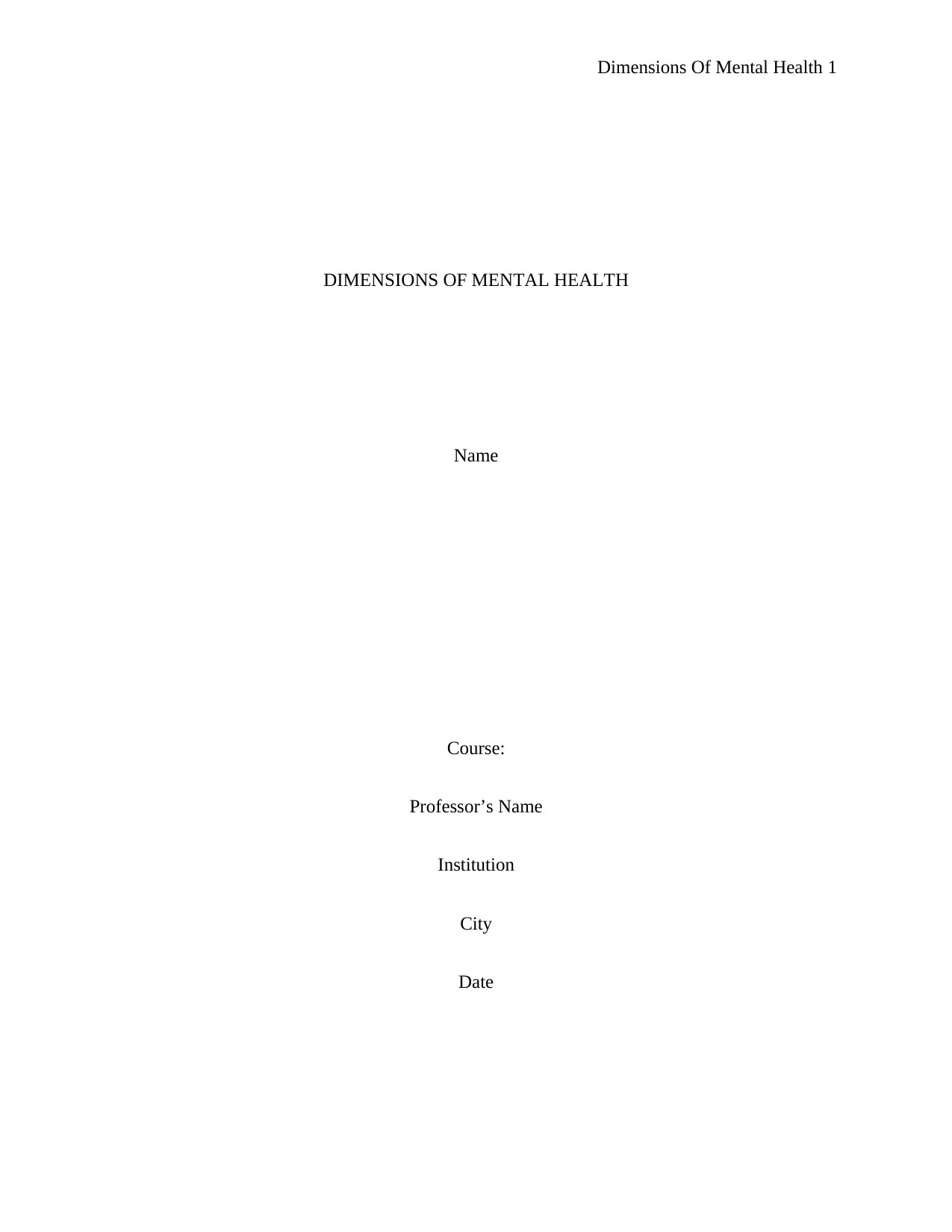
Dimensions Of Mental Health 1
DIMENSIONS OF MENTAL HEALTH
Name
Course:
Professor’s Name
Institution
City
Date
DIMENSIONS OF MENTAL HEALTH
Name
Course:
Professor’s Name
Institution
City
Date
Paraphrase This Document
Need a fresh take? Get an instant paraphrase of this document with our AI Paraphraser
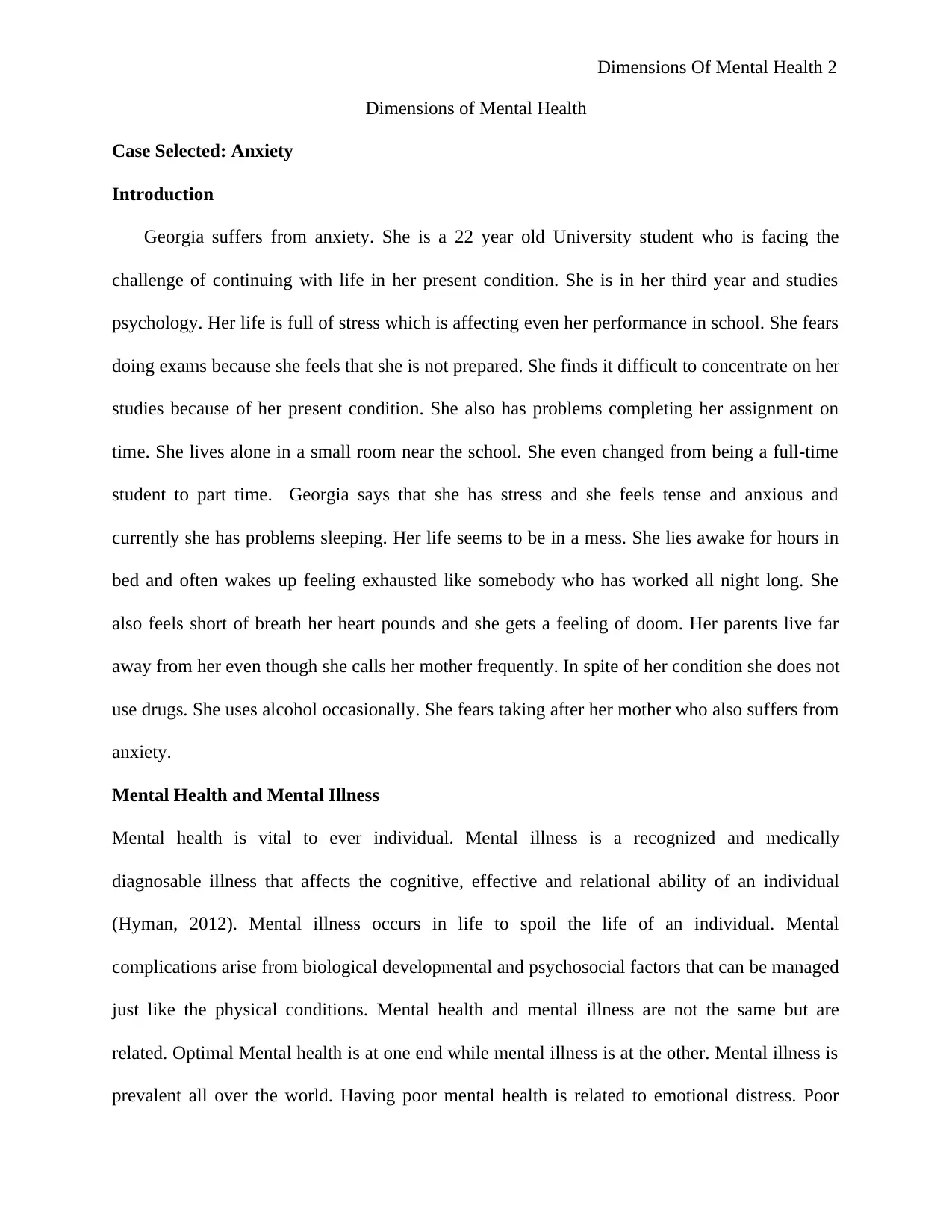
Dimensions Of Mental Health 2
Dimensions of Mental Health
Case Selected: Anxiety
Introduction
Georgia suffers from anxiety. She is a 22 year old University student who is facing the
challenge of continuing with life in her present condition. She is in her third year and studies
psychology. Her life is full of stress which is affecting even her performance in school. She fears
doing exams because she feels that she is not prepared. She finds it difficult to concentrate on her
studies because of her present condition. She also has problems completing her assignment on
time. She lives alone in a small room near the school. She even changed from being a full-time
student to part time. Georgia says that she has stress and she feels tense and anxious and
currently she has problems sleeping. Her life seems to be in a mess. She lies awake for hours in
bed and often wakes up feeling exhausted like somebody who has worked all night long. She
also feels short of breath her heart pounds and she gets a feeling of doom. Her parents live far
away from her even though she calls her mother frequently. In spite of her condition she does not
use drugs. She uses alcohol occasionally. She fears taking after her mother who also suffers from
anxiety.
Mental Health and Mental Illness
Mental health is vital to ever individual. Mental illness is a recognized and medically
diagnosable illness that affects the cognitive, effective and relational ability of an individual
(Hyman, 2012). Mental illness occurs in life to spoil the life of an individual. Mental
complications arise from biological developmental and psychosocial factors that can be managed
just like the physical conditions. Mental health and mental illness are not the same but are
related. Optimal Mental health is at one end while mental illness is at the other. Mental illness is
prevalent all over the world. Having poor mental health is related to emotional distress. Poor
Dimensions of Mental Health
Case Selected: Anxiety
Introduction
Georgia suffers from anxiety. She is a 22 year old University student who is facing the
challenge of continuing with life in her present condition. She is in her third year and studies
psychology. Her life is full of stress which is affecting even her performance in school. She fears
doing exams because she feels that she is not prepared. She finds it difficult to concentrate on her
studies because of her present condition. She also has problems completing her assignment on
time. She lives alone in a small room near the school. She even changed from being a full-time
student to part time. Georgia says that she has stress and she feels tense and anxious and
currently she has problems sleeping. Her life seems to be in a mess. She lies awake for hours in
bed and often wakes up feeling exhausted like somebody who has worked all night long. She
also feels short of breath her heart pounds and she gets a feeling of doom. Her parents live far
away from her even though she calls her mother frequently. In spite of her condition she does not
use drugs. She uses alcohol occasionally. She fears taking after her mother who also suffers from
anxiety.
Mental Health and Mental Illness
Mental health is vital to ever individual. Mental illness is a recognized and medically
diagnosable illness that affects the cognitive, effective and relational ability of an individual
(Hyman, 2012). Mental illness occurs in life to spoil the life of an individual. Mental
complications arise from biological developmental and psychosocial factors that can be managed
just like the physical conditions. Mental health and mental illness are not the same but are
related. Optimal Mental health is at one end while mental illness is at the other. Mental illness is
prevalent all over the world. Having poor mental health is related to emotional distress. Poor
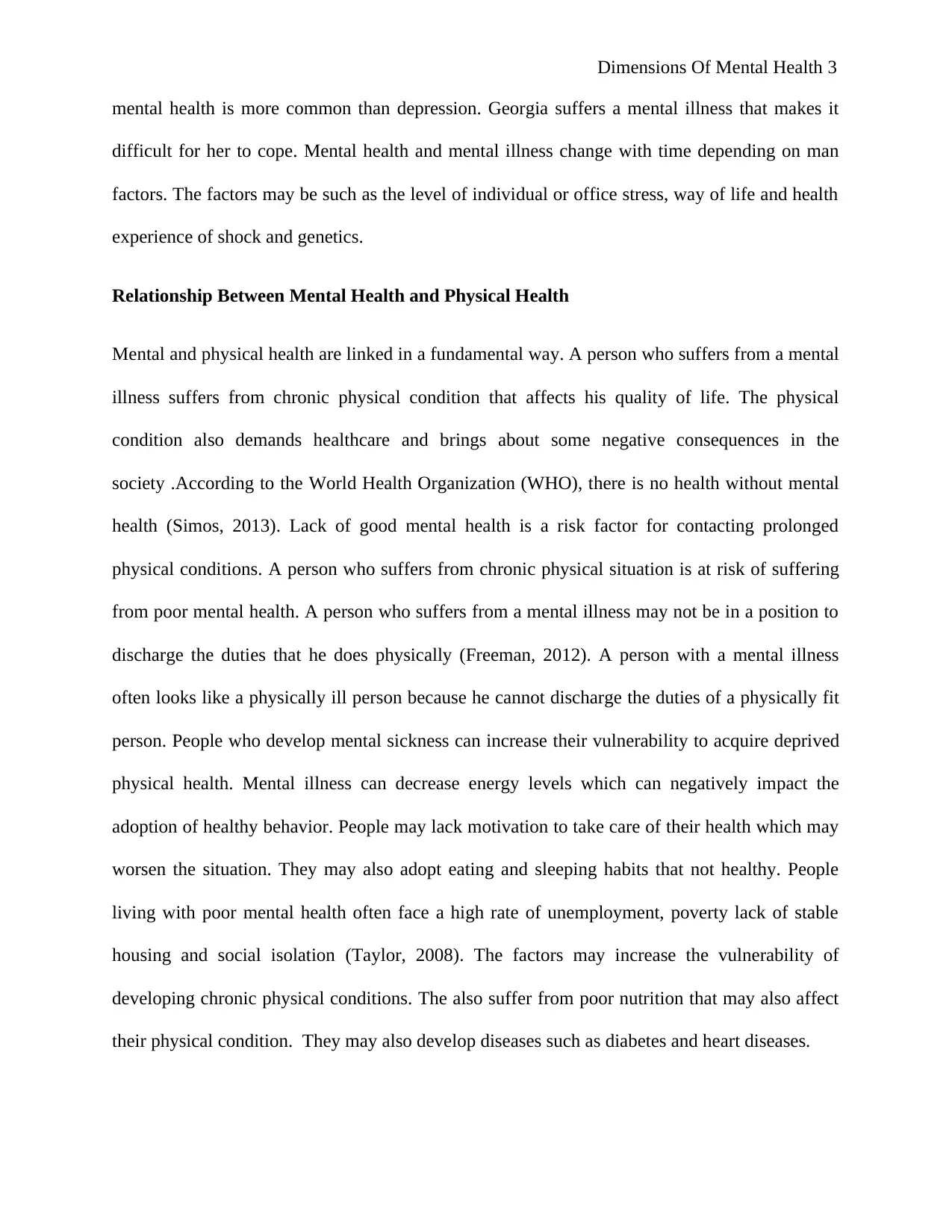
Dimensions Of Mental Health 3
mental health is more common than depression. Georgia suffers a mental illness that makes it
difficult for her to cope. Mental health and mental illness change with time depending on man
factors. The factors may be such as the level of individual or office stress, way of life and health
experience of shock and genetics.
Relationship Between Mental Health and Physical Health
Mental and physical health are linked in a fundamental way. A person who suffers from a mental
illness suffers from chronic physical condition that affects his quality of life. The physical
condition also demands healthcare and brings about some negative consequences in the
society .According to the World Health Organization (WHO), there is no health without mental
health (Simos, 2013). Lack of good mental health is a risk factor for contacting prolonged
physical conditions. A person who suffers from chronic physical situation is at risk of suffering
from poor mental health. A person who suffers from a mental illness may not be in a position to
discharge the duties that he does physically (Freeman, 2012). A person with a mental illness
often looks like a physically ill person because he cannot discharge the duties of a physically fit
person. People who develop mental sickness can increase their vulnerability to acquire deprived
physical health. Mental illness can decrease energy levels which can negatively impact the
adoption of healthy behavior. People may lack motivation to take care of their health which may
worsen the situation. They may also adopt eating and sleeping habits that not healthy. People
living with poor mental health often face a high rate of unemployment, poverty lack of stable
housing and social isolation (Taylor, 2008). The factors may increase the vulnerability of
developing chronic physical conditions. The also suffer from poor nutrition that may also affect
their physical condition. They may also develop diseases such as diabetes and heart diseases.
mental health is more common than depression. Georgia suffers a mental illness that makes it
difficult for her to cope. Mental health and mental illness change with time depending on man
factors. The factors may be such as the level of individual or office stress, way of life and health
experience of shock and genetics.
Relationship Between Mental Health and Physical Health
Mental and physical health are linked in a fundamental way. A person who suffers from a mental
illness suffers from chronic physical condition that affects his quality of life. The physical
condition also demands healthcare and brings about some negative consequences in the
society .According to the World Health Organization (WHO), there is no health without mental
health (Simos, 2013). Lack of good mental health is a risk factor for contacting prolonged
physical conditions. A person who suffers from chronic physical situation is at risk of suffering
from poor mental health. A person who suffers from a mental illness may not be in a position to
discharge the duties that he does physically (Freeman, 2012). A person with a mental illness
often looks like a physically ill person because he cannot discharge the duties of a physically fit
person. People who develop mental sickness can increase their vulnerability to acquire deprived
physical health. Mental illness can decrease energy levels which can negatively impact the
adoption of healthy behavior. People may lack motivation to take care of their health which may
worsen the situation. They may also adopt eating and sleeping habits that not healthy. People
living with poor mental health often face a high rate of unemployment, poverty lack of stable
housing and social isolation (Taylor, 2008). The factors may increase the vulnerability of
developing chronic physical conditions. The also suffer from poor nutrition that may also affect
their physical condition. They may also develop diseases such as diabetes and heart diseases.
⊘ This is a preview!⊘
Do you want full access?
Subscribe today to unlock all pages.

Trusted by 1+ million students worldwide
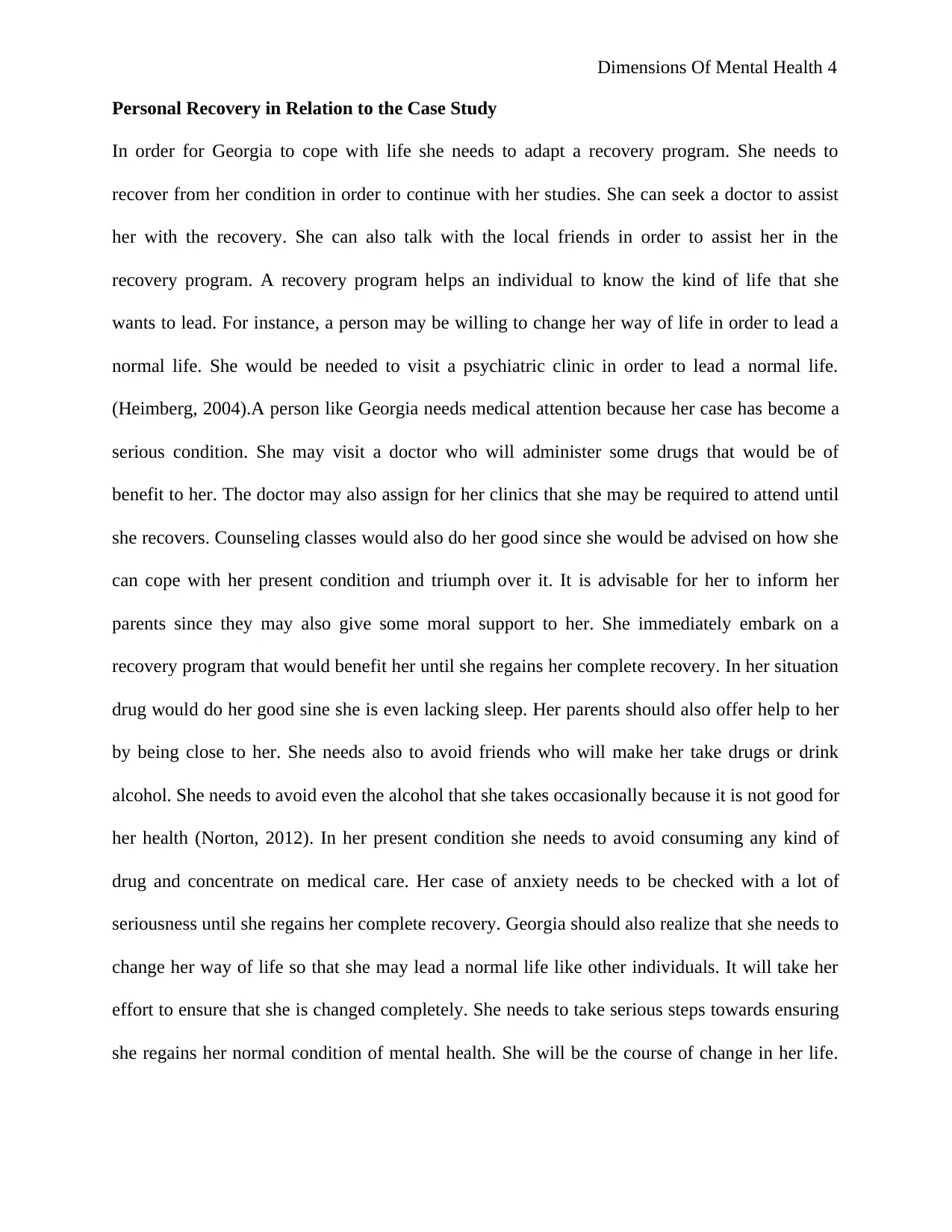
Dimensions Of Mental Health 4
Personal Recovery in Relation to the Case Study
In order for Georgia to cope with life she needs to adapt a recovery program. She needs to
recover from her condition in order to continue with her studies. She can seek a doctor to assist
her with the recovery. She can also talk with the local friends in order to assist her in the
recovery program. A recovery program helps an individual to know the kind of life that she
wants to lead. For instance, a person may be willing to change her way of life in order to lead a
normal life. She would be needed to visit a psychiatric clinic in order to lead a normal life.
(Heimberg, 2004).A person like Georgia needs medical attention because her case has become a
serious condition. She may visit a doctor who will administer some drugs that would be of
benefit to her. The doctor may also assign for her clinics that she may be required to attend until
she recovers. Counseling classes would also do her good since she would be advised on how she
can cope with her present condition and triumph over it. It is advisable for her to inform her
parents since they may also give some moral support to her. She immediately embark on a
recovery program that would benefit her until she regains her complete recovery. In her situation
drug would do her good sine she is even lacking sleep. Her parents should also offer help to her
by being close to her. She needs also to avoid friends who will make her take drugs or drink
alcohol. She needs to avoid even the alcohol that she takes occasionally because it is not good for
her health (Norton, 2012). In her present condition she needs to avoid consuming any kind of
drug and concentrate on medical care. Her case of anxiety needs to be checked with a lot of
seriousness until she regains her complete recovery. Georgia should also realize that she needs to
change her way of life so that she may lead a normal life like other individuals. It will take her
effort to ensure that she is changed completely. She needs to take serious steps towards ensuring
she regains her normal condition of mental health. She will be the course of change in her life.
Personal Recovery in Relation to the Case Study
In order for Georgia to cope with life she needs to adapt a recovery program. She needs to
recover from her condition in order to continue with her studies. She can seek a doctor to assist
her with the recovery. She can also talk with the local friends in order to assist her in the
recovery program. A recovery program helps an individual to know the kind of life that she
wants to lead. For instance, a person may be willing to change her way of life in order to lead a
normal life. She would be needed to visit a psychiatric clinic in order to lead a normal life.
(Heimberg, 2004).A person like Georgia needs medical attention because her case has become a
serious condition. She may visit a doctor who will administer some drugs that would be of
benefit to her. The doctor may also assign for her clinics that she may be required to attend until
she recovers. Counseling classes would also do her good since she would be advised on how she
can cope with her present condition and triumph over it. It is advisable for her to inform her
parents since they may also give some moral support to her. She immediately embark on a
recovery program that would benefit her until she regains her complete recovery. In her situation
drug would do her good sine she is even lacking sleep. Her parents should also offer help to her
by being close to her. She needs also to avoid friends who will make her take drugs or drink
alcohol. She needs to avoid even the alcohol that she takes occasionally because it is not good for
her health (Norton, 2012). In her present condition she needs to avoid consuming any kind of
drug and concentrate on medical care. Her case of anxiety needs to be checked with a lot of
seriousness until she regains her complete recovery. Georgia should also realize that she needs to
change her way of life so that she may lead a normal life like other individuals. It will take her
effort to ensure that she is changed completely. She needs to take serious steps towards ensuring
she regains her normal condition of mental health. She will be the course of change in her life.
Paraphrase This Document
Need a fresh take? Get an instant paraphrase of this document with our AI Paraphraser
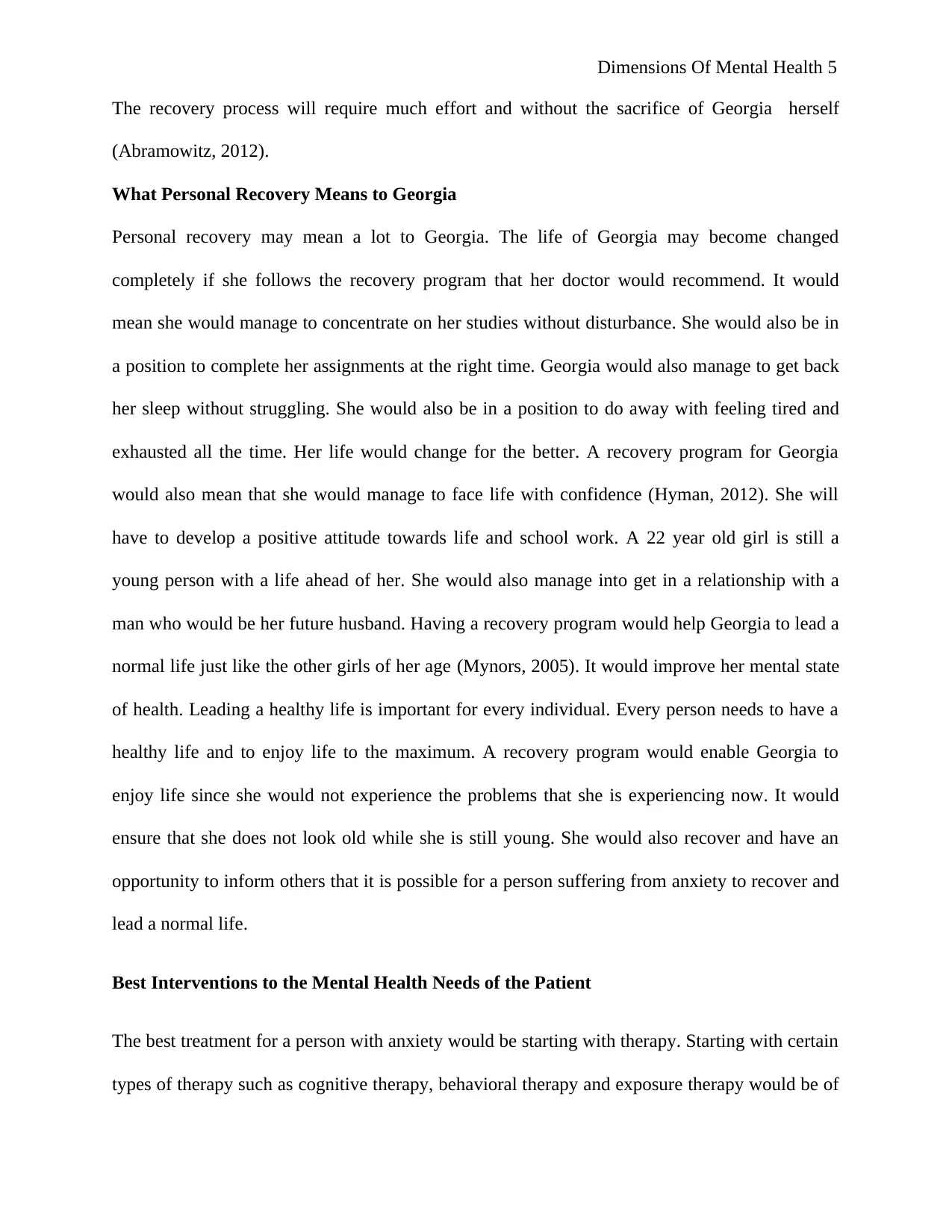
Dimensions Of Mental Health 5
The recovery process will require much effort and without the sacrifice of Georgia herself
(Abramowitz, 2012).
What Personal Recovery Means to Georgia
Personal recovery may mean a lot to Georgia. The life of Georgia may become changed
completely if she follows the recovery program that her doctor would recommend. It would
mean she would manage to concentrate on her studies without disturbance. She would also be in
a position to complete her assignments at the right time. Georgia would also manage to get back
her sleep without struggling. She would also be in a position to do away with feeling tired and
exhausted all the time. Her life would change for the better. A recovery program for Georgia
would also mean that she would manage to face life with confidence (Hyman, 2012). She will
have to develop a positive attitude towards life and school work. A 22 year old girl is still a
young person with a life ahead of her. She would also manage into get in a relationship with a
man who would be her future husband. Having a recovery program would help Georgia to lead a
normal life just like the other girls of her age (Mynors, 2005). It would improve her mental state
of health. Leading a healthy life is important for every individual. Every person needs to have a
healthy life and to enjoy life to the maximum. A recovery program would enable Georgia to
enjoy life since she would not experience the problems that she is experiencing now. It would
ensure that she does not look old while she is still young. She would also recover and have an
opportunity to inform others that it is possible for a person suffering from anxiety to recover and
lead a normal life.
Best Interventions to the Mental Health Needs of the Patient
The best treatment for a person with anxiety would be starting with therapy. Starting with certain
types of therapy such as cognitive therapy, behavioral therapy and exposure therapy would be of
The recovery process will require much effort and without the sacrifice of Georgia herself
(Abramowitz, 2012).
What Personal Recovery Means to Georgia
Personal recovery may mean a lot to Georgia. The life of Georgia may become changed
completely if she follows the recovery program that her doctor would recommend. It would
mean she would manage to concentrate on her studies without disturbance. She would also be in
a position to complete her assignments at the right time. Georgia would also manage to get back
her sleep without struggling. She would also be in a position to do away with feeling tired and
exhausted all the time. Her life would change for the better. A recovery program for Georgia
would also mean that she would manage to face life with confidence (Hyman, 2012). She will
have to develop a positive attitude towards life and school work. A 22 year old girl is still a
young person with a life ahead of her. She would also manage into get in a relationship with a
man who would be her future husband. Having a recovery program would help Georgia to lead a
normal life just like the other girls of her age (Mynors, 2005). It would improve her mental state
of health. Leading a healthy life is important for every individual. Every person needs to have a
healthy life and to enjoy life to the maximum. A recovery program would enable Georgia to
enjoy life since she would not experience the problems that she is experiencing now. It would
ensure that she does not look old while she is still young. She would also recover and have an
opportunity to inform others that it is possible for a person suffering from anxiety to recover and
lead a normal life.
Best Interventions to the Mental Health Needs of the Patient
The best treatment for a person with anxiety would be starting with therapy. Starting with certain
types of therapy such as cognitive therapy, behavioral therapy and exposure therapy would be of
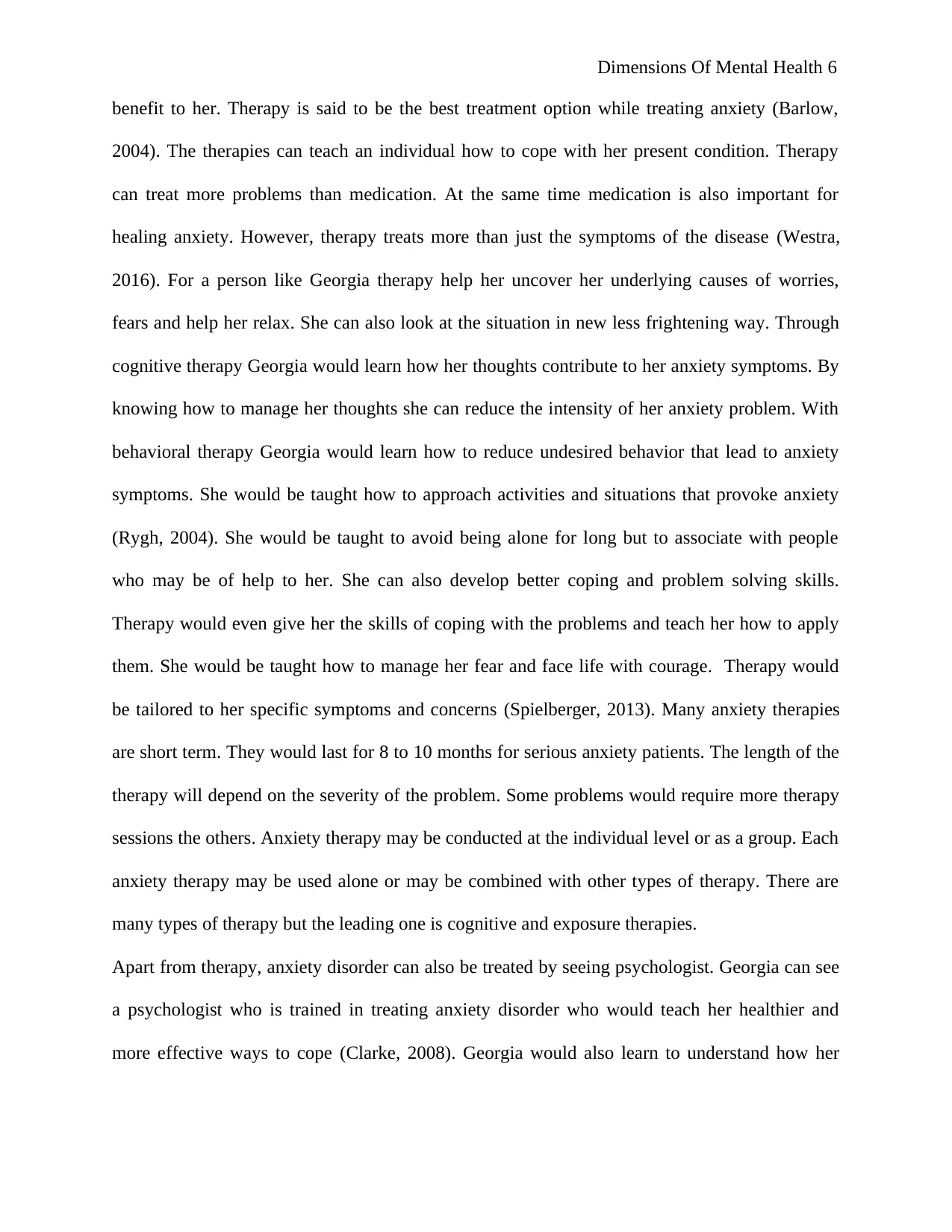
Dimensions Of Mental Health 6
benefit to her. Therapy is said to be the best treatment option while treating anxiety (Barlow,
2004). The therapies can teach an individual how to cope with her present condition. Therapy
can treat more problems than medication. At the same time medication is also important for
healing anxiety. However, therapy treats more than just the symptoms of the disease (Westra,
2016). For a person like Georgia therapy help her uncover her underlying causes of worries,
fears and help her relax. She can also look at the situation in new less frightening way. Through
cognitive therapy Georgia would learn how her thoughts contribute to her anxiety symptoms. By
knowing how to manage her thoughts she can reduce the intensity of her anxiety problem. With
behavioral therapy Georgia would learn how to reduce undesired behavior that lead to anxiety
symptoms. She would be taught how to approach activities and situations that provoke anxiety
(Rygh, 2004). She would be taught to avoid being alone for long but to associate with people
who may be of help to her. She can also develop better coping and problem solving skills.
Therapy would even give her the skills of coping with the problems and teach her how to apply
them. She would be taught how to manage her fear and face life with courage. Therapy would
be tailored to her specific symptoms and concerns (Spielberger, 2013). Many anxiety therapies
are short term. They would last for 8 to 10 months for serious anxiety patients. The length of the
therapy will depend on the severity of the problem. Some problems would require more therapy
sessions the others. Anxiety therapy may be conducted at the individual level or as a group. Each
anxiety therapy may be used alone or may be combined with other types of therapy. There are
many types of therapy but the leading one is cognitive and exposure therapies.
Apart from therapy, anxiety disorder can also be treated by seeing psychologist. Georgia can see
a psychologist who is trained in treating anxiety disorder who would teach her healthier and
more effective ways to cope (Clarke, 2008). Georgia would also learn to understand how her
benefit to her. Therapy is said to be the best treatment option while treating anxiety (Barlow,
2004). The therapies can teach an individual how to cope with her present condition. Therapy
can treat more problems than medication. At the same time medication is also important for
healing anxiety. However, therapy treats more than just the symptoms of the disease (Westra,
2016). For a person like Georgia therapy help her uncover her underlying causes of worries,
fears and help her relax. She can also look at the situation in new less frightening way. Through
cognitive therapy Georgia would learn how her thoughts contribute to her anxiety symptoms. By
knowing how to manage her thoughts she can reduce the intensity of her anxiety problem. With
behavioral therapy Georgia would learn how to reduce undesired behavior that lead to anxiety
symptoms. She would be taught how to approach activities and situations that provoke anxiety
(Rygh, 2004). She would be taught to avoid being alone for long but to associate with people
who may be of help to her. She can also develop better coping and problem solving skills.
Therapy would even give her the skills of coping with the problems and teach her how to apply
them. She would be taught how to manage her fear and face life with courage. Therapy would
be tailored to her specific symptoms and concerns (Spielberger, 2013). Many anxiety therapies
are short term. They would last for 8 to 10 months for serious anxiety patients. The length of the
therapy will depend on the severity of the problem. Some problems would require more therapy
sessions the others. Anxiety therapy may be conducted at the individual level or as a group. Each
anxiety therapy may be used alone or may be combined with other types of therapy. There are
many types of therapy but the leading one is cognitive and exposure therapies.
Apart from therapy, anxiety disorder can also be treated by seeing psychologist. Georgia can see
a psychologist who is trained in treating anxiety disorder who would teach her healthier and
more effective ways to cope (Clarke, 2008). Georgia would also learn to understand how her
⊘ This is a preview!⊘
Do you want full access?
Subscribe today to unlock all pages.

Trusted by 1+ million students worldwide
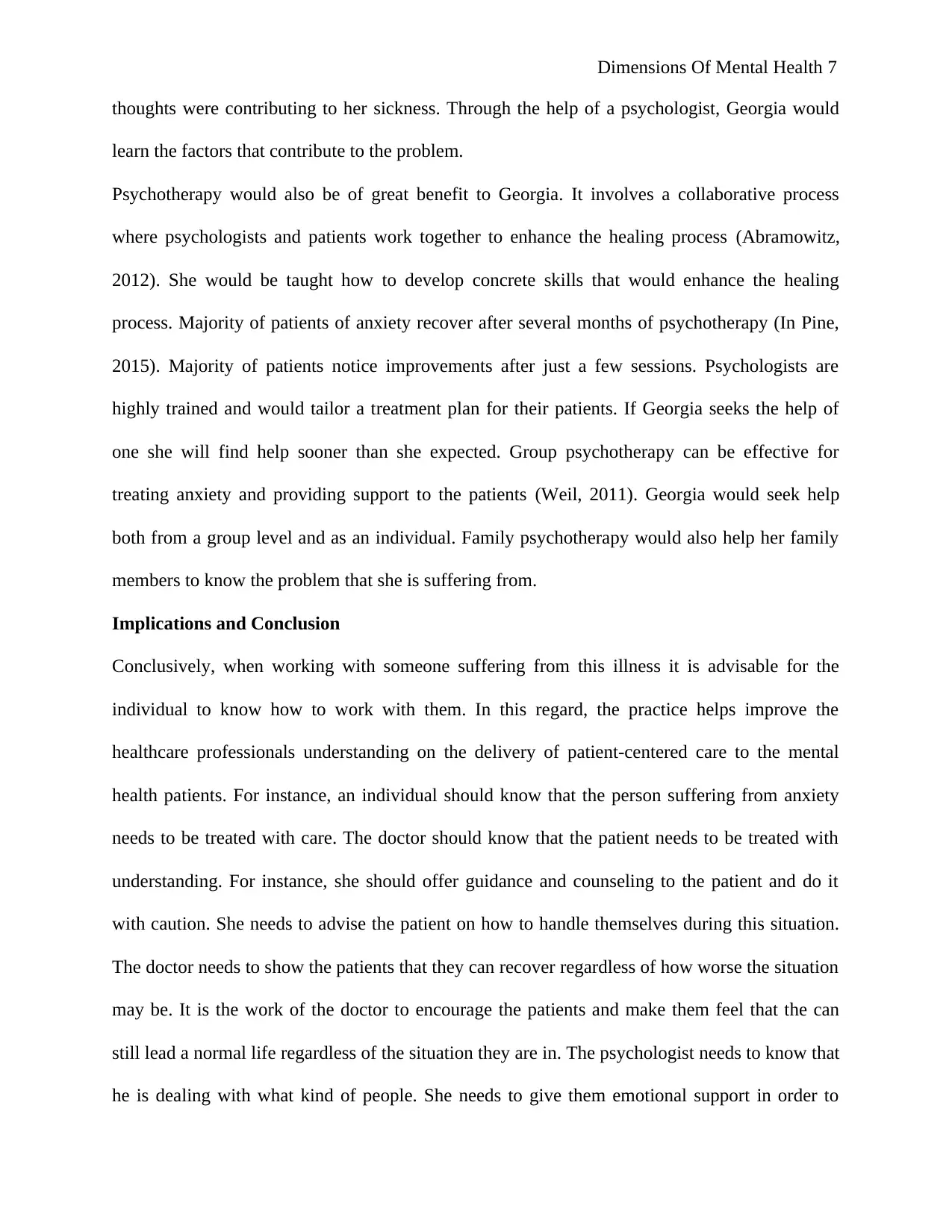
Dimensions Of Mental Health 7
thoughts were contributing to her sickness. Through the help of a psychologist, Georgia would
learn the factors that contribute to the problem.
Psychotherapy would also be of great benefit to Georgia. It involves a collaborative process
where psychologists and patients work together to enhance the healing process (Abramowitz,
2012). She would be taught how to develop concrete skills that would enhance the healing
process. Majority of patients of anxiety recover after several months of psychotherapy (In Pine,
2015). Majority of patients notice improvements after just a few sessions. Psychologists are
highly trained and would tailor a treatment plan for their patients. If Georgia seeks the help of
one she will find help sooner than she expected. Group psychotherapy can be effective for
treating anxiety and providing support to the patients (Weil, 2011). Georgia would seek help
both from a group level and as an individual. Family psychotherapy would also help her family
members to know the problem that she is suffering from.
Implications and Conclusion
Conclusively, when working with someone suffering from this illness it is advisable for the
individual to know how to work with them. In this regard, the practice helps improve the
healthcare professionals understanding on the delivery of patient-centered care to the mental
health patients. For instance, an individual should know that the person suffering from anxiety
needs to be treated with care. The doctor should know that the patient needs to be treated with
understanding. For instance, she should offer guidance and counseling to the patient and do it
with caution. She needs to advise the patient on how to handle themselves during this situation.
The doctor needs to show the patients that they can recover regardless of how worse the situation
may be. It is the work of the doctor to encourage the patients and make them feel that the can
still lead a normal life regardless of the situation they are in. The psychologist needs to know that
he is dealing with what kind of people. She needs to give them emotional support in order to
thoughts were contributing to her sickness. Through the help of a psychologist, Georgia would
learn the factors that contribute to the problem.
Psychotherapy would also be of great benefit to Georgia. It involves a collaborative process
where psychologists and patients work together to enhance the healing process (Abramowitz,
2012). She would be taught how to develop concrete skills that would enhance the healing
process. Majority of patients of anxiety recover after several months of psychotherapy (In Pine,
2015). Majority of patients notice improvements after just a few sessions. Psychologists are
highly trained and would tailor a treatment plan for their patients. If Georgia seeks the help of
one she will find help sooner than she expected. Group psychotherapy can be effective for
treating anxiety and providing support to the patients (Weil, 2011). Georgia would seek help
both from a group level and as an individual. Family psychotherapy would also help her family
members to know the problem that she is suffering from.
Implications and Conclusion
Conclusively, when working with someone suffering from this illness it is advisable for the
individual to know how to work with them. In this regard, the practice helps improve the
healthcare professionals understanding on the delivery of patient-centered care to the mental
health patients. For instance, an individual should know that the person suffering from anxiety
needs to be treated with care. The doctor should know that the patient needs to be treated with
understanding. For instance, she should offer guidance and counseling to the patient and do it
with caution. She needs to advise the patient on how to handle themselves during this situation.
The doctor needs to show the patients that they can recover regardless of how worse the situation
may be. It is the work of the doctor to encourage the patients and make them feel that the can
still lead a normal life regardless of the situation they are in. The psychologist needs to know that
he is dealing with what kind of people. She needs to give them emotional support in order to
Paraphrase This Document
Need a fresh take? Get an instant paraphrase of this document with our AI Paraphraser

Dimensions Of Mental Health 8
encourage them to go on with life. She needs to listen to their stories so that she may know how
to help them. The doctor needs to show the patients that there is a life ahead of them. She also
needs to treat them in a friendly manner so that they would feel loved.
encourage them to go on with life. She needs to listen to their stories so that she may know how
to help them. The doctor needs to show the patients that there is a life ahead of them. She also
needs to treat them in a friendly manner so that they would feel loved.
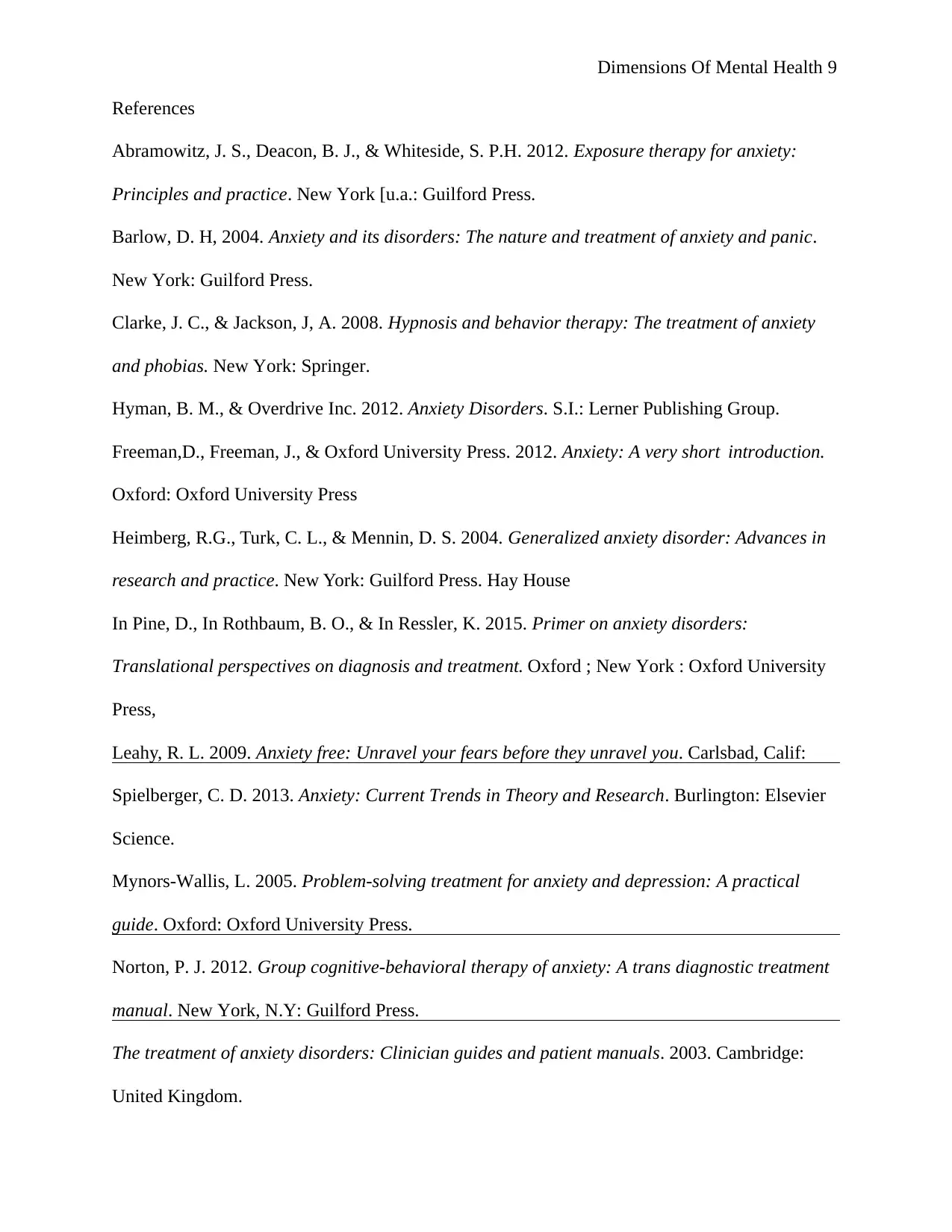
Dimensions Of Mental Health 9
References
Abramowitz, J. S., Deacon, B. J., & Whiteside, S. P.H. 2012. Exposure therapy for anxiety:
Principles and practice. New York [u.a.: Guilford Press.
Barlow, D. H, 2004. Anxiety and its disorders: The nature and treatment of anxiety and panic.
New York: Guilford Press.
Clarke, J. C., & Jackson, J, A. 2008. Hypnosis and behavior therapy: The treatment of anxiety
and phobias. New York: Springer.
Hyman, B. M., & Overdrive Inc. 2012. Anxiety Disorders. S.I.: Lerner Publishing Group.
Freeman,D., Freeman, J., & Oxford University Press. 2012. Anxiety: A very short introduction.
Oxford: Oxford University Press
Heimberg, R.G., Turk, C. L., & Mennin, D. S. 2004. Generalized anxiety disorder: Advances in
research and practice. New York: Guilford Press. Hay House
In Pine, D., In Rothbaum, B. O., & In Ressler, K. 2015. Primer on anxiety disorders:
Translational perspectives on diagnosis and treatment. Oxford ; New York : Oxford University
Press,
Leahy, R. L. 2009. Anxiety free: Unravel your fears before they unravel you. Carlsbad, Calif:
Spielberger, C. D. 2013. Anxiety: Current Trends in Theory and Research. Burlington: Elsevier
Science.
Mynors-Wallis, L. 2005. Problem-solving treatment for anxiety and depression: A practical
guide. Oxford: Oxford University Press.
Norton, P. J. 2012. Group cognitive-behavioral therapy of anxiety: A trans diagnostic treatment
manual. New York, N.Y: Guilford Press.
The treatment of anxiety disorders: Clinician guides and patient manuals. 2003. Cambridge:
United Kingdom.
References
Abramowitz, J. S., Deacon, B. J., & Whiteside, S. P.H. 2012. Exposure therapy for anxiety:
Principles and practice. New York [u.a.: Guilford Press.
Barlow, D. H, 2004. Anxiety and its disorders: The nature and treatment of anxiety and panic.
New York: Guilford Press.
Clarke, J. C., & Jackson, J, A. 2008. Hypnosis and behavior therapy: The treatment of anxiety
and phobias. New York: Springer.
Hyman, B. M., & Overdrive Inc. 2012. Anxiety Disorders. S.I.: Lerner Publishing Group.
Freeman,D., Freeman, J., & Oxford University Press. 2012. Anxiety: A very short introduction.
Oxford: Oxford University Press
Heimberg, R.G., Turk, C. L., & Mennin, D. S. 2004. Generalized anxiety disorder: Advances in
research and practice. New York: Guilford Press. Hay House
In Pine, D., In Rothbaum, B. O., & In Ressler, K. 2015. Primer on anxiety disorders:
Translational perspectives on diagnosis and treatment. Oxford ; New York : Oxford University
Press,
Leahy, R. L. 2009. Anxiety free: Unravel your fears before they unravel you. Carlsbad, Calif:
Spielberger, C. D. 2013. Anxiety: Current Trends in Theory and Research. Burlington: Elsevier
Science.
Mynors-Wallis, L. 2005. Problem-solving treatment for anxiety and depression: A practical
guide. Oxford: Oxford University Press.
Norton, P. J. 2012. Group cognitive-behavioral therapy of anxiety: A trans diagnostic treatment
manual. New York, N.Y: Guilford Press.
The treatment of anxiety disorders: Clinician guides and patient manuals. 2003. Cambridge:
United Kingdom.
⊘ This is a preview!⊘
Do you want full access?
Subscribe today to unlock all pages.

Trusted by 1+ million students worldwide
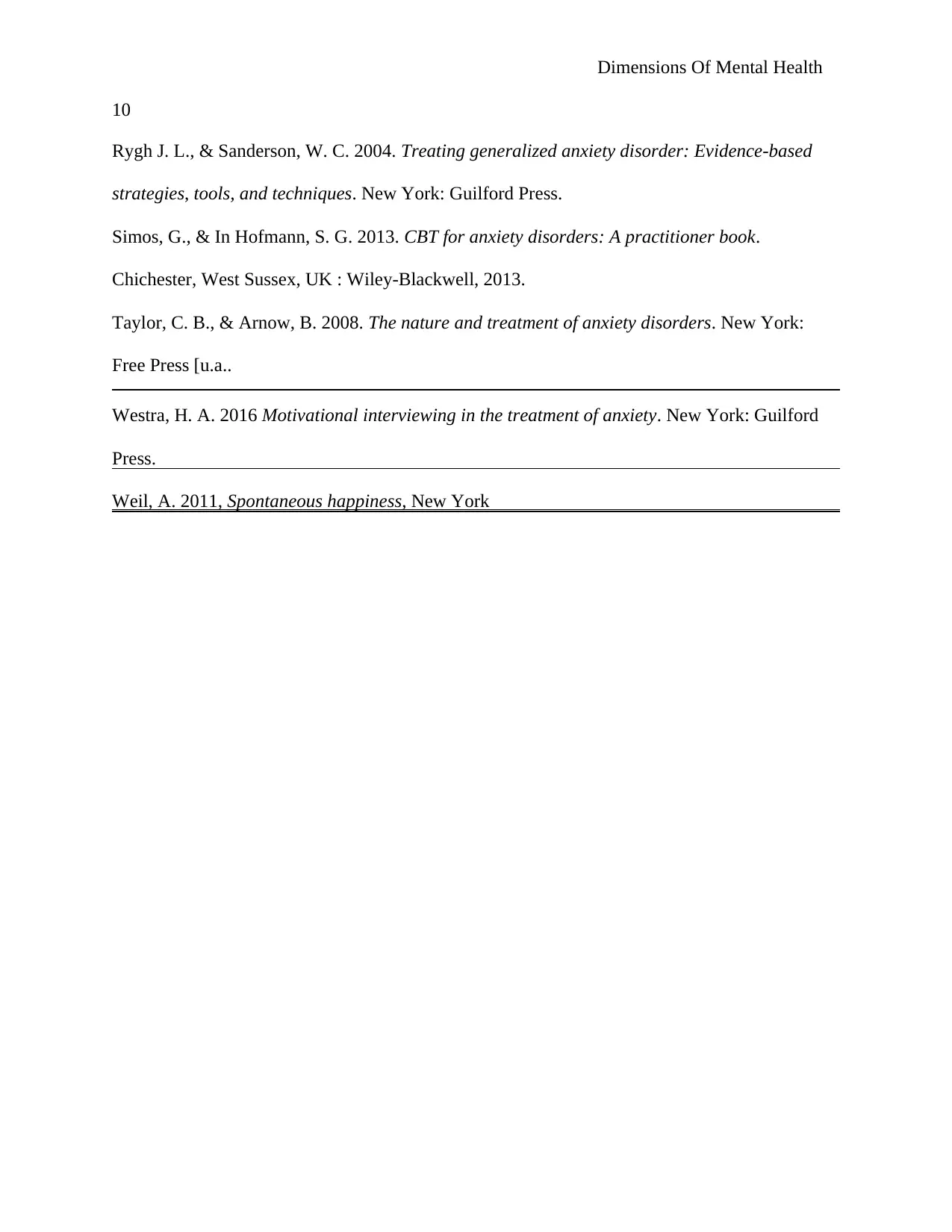
Dimensions Of Mental Health
10
Rygh J. L., & Sanderson, W. C. 2004. Treating generalized anxiety disorder: Evidence-based
strategies, tools, and techniques. New York: Guilford Press.
Simos, G., & In Hofmann, S. G. 2013. CBT for anxiety disorders: A practitioner book.
Chichester, West Sussex, UK : Wiley-Blackwell, 2013.
Taylor, C. B., & Arnow, B. 2008. The nature and treatment of anxiety disorders. New York:
Free Press [u.a..
Westra, H. A. 2016 Motivational interviewing in the treatment of anxiety. New York: Guilford
Press.
Weil, A. 2011, Spontaneous happiness, New York
10
Rygh J. L., & Sanderson, W. C. 2004. Treating generalized anxiety disorder: Evidence-based
strategies, tools, and techniques. New York: Guilford Press.
Simos, G., & In Hofmann, S. G. 2013. CBT for anxiety disorders: A practitioner book.
Chichester, West Sussex, UK : Wiley-Blackwell, 2013.
Taylor, C. B., & Arnow, B. 2008. The nature and treatment of anxiety disorders. New York:
Free Press [u.a..
Westra, H. A. 2016 Motivational interviewing in the treatment of anxiety. New York: Guilford
Press.
Weil, A. 2011, Spontaneous happiness, New York
1 out of 10
Related Documents
Your All-in-One AI-Powered Toolkit for Academic Success.
+13062052269
info@desklib.com
Available 24*7 on WhatsApp / Email
![[object Object]](/_next/static/media/star-bottom.7253800d.svg)
Unlock your academic potential
Copyright © 2020–2026 A2Z Services. All Rights Reserved. Developed and managed by ZUCOL.





